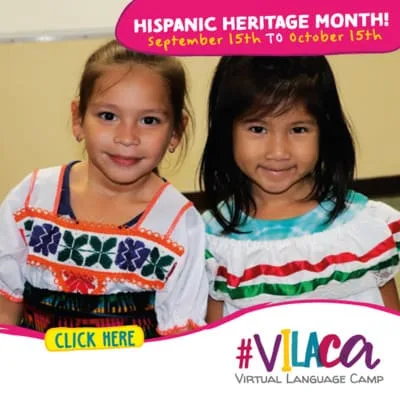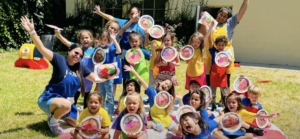“Trick Or Treat, smell my feet, give me something good to eat.
If you don’t, I don’t care, I’ll give you the biggest scare!”
I swung my plastic pumpkin container back and forth listening to the treasure trove of candy swirl around and belting out the song with my best friend by my side. Eight years old and living like a queen during the best time of the year. For the humble price of a polar bear costume, complete with itchy, black makeup on my nose, I could walk up to any door in the neighborhood and demand the handful of candy that they were culturally obliged to give out. While your children are focusing on candy and costumes, did you know that you can trick your children into practicing their spanish on Halloween? Here are ten ways to practice Spanish while Trick or Treating:
- Learn Halloween Vocabulary
Teaching your child words like el disfraz (the costume), el dulce (the candy), la calabaza (the pumpkin) and insisting they use the Spanish word rather than the English one will reinforce the vocabulary in a hands-on way.
- Create a Latin American Themed Costume
Research and prepare a Latin American themed costume this year. Some suggestions include a Day of the Dead (Día de los Muertos) Calavera, Frida Kahlo, Inca or Aztec Warrior, Mariachi Musician, Amazon Rainforest Explorer, Gaucho.
- Describe the Costume in Spanish
Teach your child some Spanish adjectives such as brillante (sparkly), suave (soft), colorido (colorful), aventurero (adventerous), espeluznante (spooky), to help them describe their costume.
- Prepare a Short Script
Before your child walks up to a door, have them rehearse a Spanish script. If they are a beginner, use a simple phrase like “Dulce o truco” (trick or treat – literally candy or trick). If your child is more advanced in the language, they can say “¿Puedo tener un dulce, por favor?” (Can I have a candy, please?).
- `Halloween Songs in Spanish
Learn a Halloween song and sing it together as you walk the streets. Here is an easy song we suggest:
“Monstruos en la Noche”
(Tune: “Twinkle, Twinkle, Little Star”)
Monstruos en la noche,
¿Dónde pueden estar?
En la casa encantada,
Van a bailar.
Translation: Monsters in the night, where can they be? In the haunted house, they’re going to dance.
- Say Thank You in Spanish
Saying “gracias” (thank you) after receiving a candy or costume compliment is an easy and polite way to practice the language.
- Spooky Spanish Stories
Look up some spooky Latin American folk legends and myths to tell your children such as El Cuyancúa, El sombreron, El Muqui, La ajorca de oro, Sisimite, and El duende. Or you can create your own stories and use Spanish words .
- Engage in Conversations:
Don’t be afraid to engage in short conversations with neighbors who speak Spanish. You can ask them about their Halloween decorations, compliment their costumes, or make small talk about the holiday.
- Count Your Treats in Spanish:
When you arrive back at home after trick or treating, play Spanish counting games with different piles, types, or brands of candy. This will reinforce your child’s number vocabulary.
- Candy Sharing and Trading
If you’re trick or treating with a group, consider sharing or trading candies in Spanish. You can “¿Quieres intercambiar?” (Do you want to trade?) and “este por aquel” (This one for that one).
Here at Cultural Bytes, we believe that if you’re not having fun then you’re not learning properly. Our Virtual Language Camp, Vilaca, combines the fun of celebrations (like Halloween) with culturally relevant, helpful Spanish vocabulary and phrases to “trick” your child into enjoying the learning language process. Sign up today and see for yourself!
If you liked our article and want more information, contact us, click here








